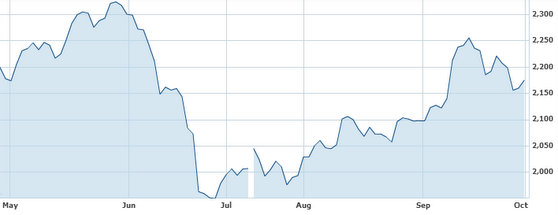Main reference: Story in Sinafinance by a market watcher
DURING TIMES OF market uncertainty, we’re far more likely to be burned by selling stocks prematurely.
The benchmark Shanghai Composite Index – chief tracker of A- and B-shares listed in Shanghai and Shenzhen – is currently hovering around 2,200 points.
That’s up 4.1% from a year ago but down nearly 10% from February levels.
And summer 2013 trading has seen a series of peaks and valleys that would put the fear of the bourse god in any retail investor.
 Many investors grow skittish and bail out when things first start going down. Photo: qzhbTherefore, it’s little wonder that shareholders are a bit skittish of late, always looking over their shoulders for a whiff of a major selloff in the cards.
Many investors grow skittish and bail out when things first start going down. Photo: qzhbTherefore, it’s little wonder that shareholders are a bit skittish of late, always looking over their shoulders for a whiff of a major selloff in the cards.
That means the risk of an early bailout – that is, having an itchy trigger finger – is very much heightened during periods of market volatility like that which we are witnessing now.
When things are reasonably good and the portfolio’s value is growing at a respectable clip, most shareholders are very averse to any added risk or hazards deemed excessive.
Their apple cart is well stocked with fresh, shiny fruit and they are not at all in the mood to upset the cart and lose all they’ve worked so hard for.
During times of turbulence, people abandon ship at the first sign of stormy weather.
It also reinforces the psychology of quitting while you’re ahead, and has everyone in this camp glued to all the indicators, with a collective finger on the trigger.
We say to ourselves that we’ve finally found a few good earners amid the chaos and we’ll be darned if we’re going to lose it all and start afresh again.
We could call this mode of thinking “The Definite Effect” wherein those of us with a growing portfolio and a steady investing income stream become very reliant on stable returns and thus turn highly risk averse.
But these same investors are also generally pessimistic on a long-term basis, and somehow feel they’ve beaten Lady Luck for so long that the chickens are about to come home to roost.
 Recent China shares performance. Source: Yahoo Finance
Recent China shares performance. Source: Yahoo Finance
Therefore, they are much more likely to gut their portfolio of certain stocks that rise faster than expected -- far earlier than the more experienced, long-term investor would tolerate.
Of course it is only natural that we all want to sell our stocks at levels higher than we paid for them, so when the share price flirts with our entry price and below, many of us get nervous and pull the plug prematurely.
That impulse is normal and often logical, but discounts the possibility of short-term fluctuations – putting a premium on these movements over long-term potential growth.
We’ve all experienced both sides of the coin.
We've sold a stock far too early, only to watch it double or triple in value after pulling out.
We've also waited too long on occasion, thinking we'd discovered that proverbial diamond in the rough, only to find it was more like fool’s gold and not going anywhere fast.
From experience, I think most of us can agree that the first mistake is more painful than the second.
See also:
Chinese Teenager Designs Market-Outsmarting Software







